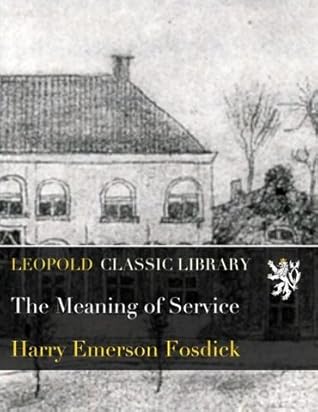- Bible
- Read the Bible
- Bible Versions
- Verse of the Day
- Reading Plans
- Verses by Topic
- Books of the Bible
- Bible Images
- Study
- Commentaries
- Concordances
- Dictionaries
- Encyclopedias
- Sermons
- Bible Atlas & Maps
- BP Wiki
- Devotionals
- Today's Devotionals
- Light of the World
- All Devotionals
- Inspirational Quotes
- More
- Picture Quotes
- Videos
- Inspirational
- Bible Study
- What The Bible Says
- Bible Q&As
- Daily Bread
- Bible by Genre
- Bible Stories
- Random Bible Verse
- Community
- Store
The Meaning of Service
by Harry Emerson Fosdick
Leopold is delighted to publish this classic book as part of our extensive Classic Library collection. Many of the books in our collection have been out of print for decades, and therefore have not been accessible to the general public. The aim of our publishing program is to facilitate rapid access to this vast reservoir of literature, and our view is that this is a significant literary work, which deserves to be brought back into print after many decades. The contents of the vast majority of titles in the Classic Library have been scanned from the original works. To ensure a high quality product, each title has been meticulously hand curated by our staff. This means that we have checked every single page in every title, making it highly unlikely that any material imperfections – such as poor picture quality, blurred or missing text - remain. When our staff observed such imperfections in the original work, these have either been repaired, or the title has been excluded from the Leopold Classic Library catalogue. As part of our on-going commitment to delivering value to the reader, within the book we have also provided you with a link to a website, where you may download a digital version of this work for free. Our philosophy has been guided by a desire to provide the reader with a book that is as close as possible to ownership of the original work. We hope that you will enjoy this wonderful classic work, and that for you it becomes an enriching experience. If you would like to learn more about the Leopold Classic Library collection please visit our website
BUY NOW
Paperback
Published January 4th 2016 by Leopold Classic Library
© 2025 Bibleportal.com All rights reserved.

1878-1969
Harry Emerson Fosdick was an American clergyman. He was born in Buffalo, New York. He graduated from Colgate University in 1900, and Union Theological Seminary in 1904. While attending Colgate University he joined the Delta Upsilon Fraternity. He was ordained a Baptist minister in 1903 at the Madison Avenue Baptist Church at 31st Street. Fosdick was the most prominent liberal Baptist minister of the early 20th Century. Although a Baptist, he was Pastor of the First Presbyterian Church on West Twelfth Street and then at the historic, interdenominational Riverside Church (the congregation moved from the then-named Park Avenue Baptist Church, now the Central Presbyterian Church) in New York City.
Fosdick became a central figure in the conflict between fundamentalist and liberal forces within American Protestantism in the 1920s and 1930s. He saw the history of Christianity as one of development, progress, and gradual change. To the fundamentalists, this was rank apostasy, and the battle lines were drawn.
Fosdick was an outspoken opponent of racism and injustice. Fosdick's sermons won him wide recognition, as did his radio addresses which were nationally broadcast. He authored numerous books, and many of his sermon collections are still in print. He is also the author of the hymn, "God of Grace and God of Glory"
... Show more